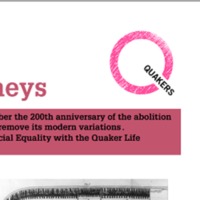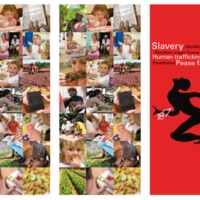
Quakers and the path to abolition in Britain and the colonies
The Society of Friends expressed its formal opposition to the slave trade in 1727, and from that date were vocal opponents of transatlantic slavery. A virtual exhibition of archived resources, ‘Quakers and the path to abolition in Britain and the colonies’, was launched online to commemorate the bicentenary. It traced the history of the anti-slavery movement from its Quaker beginnings and highlighted key events in the Quaker history of opposition to the slave trade, and was primarily based on material from the Library at Friends House. The exhibition also explained the important role played by Quaker women abolitionists through writing and poetry. The Quakers pioneered contemporary tactics such as boycotting, petitions, leafleting and poster campaigns.
Other resources to help people find out more about the bicentenary included ‘Abolition Journeys’, developed by Quaker Life Committee for Racial Equality with the Quaker Life Children and Young People’s Staff Team, designed to help people of all ages remember the slave trade and work to abolish its modern variations.

Slavery Here!
Slavery here! was a project hosted by museums across the Tees Valley led by Preston Hall Museum. It featured an interactive exhibition to explore the story of the Tees Valley’s connections with slavery. For example, the town of Stockton-on-Tees had its own Sugar House, a refinery that processed sugar from the Caribbean. The exhibition also looked at the work of local abolitionist campaigners Dr Robert Jackson and Elizabeth Pease, and the impact of contemporary slavery on today's society. Alongside the exhibition at Preston Hall Museum, other special events included workshops on African drumming and culture, object handling, and introductions to Fair Trade products. The project also produced a commemorative quilt (in collaboration with Newtown Community) and a film, ‘Manacles and Money’.